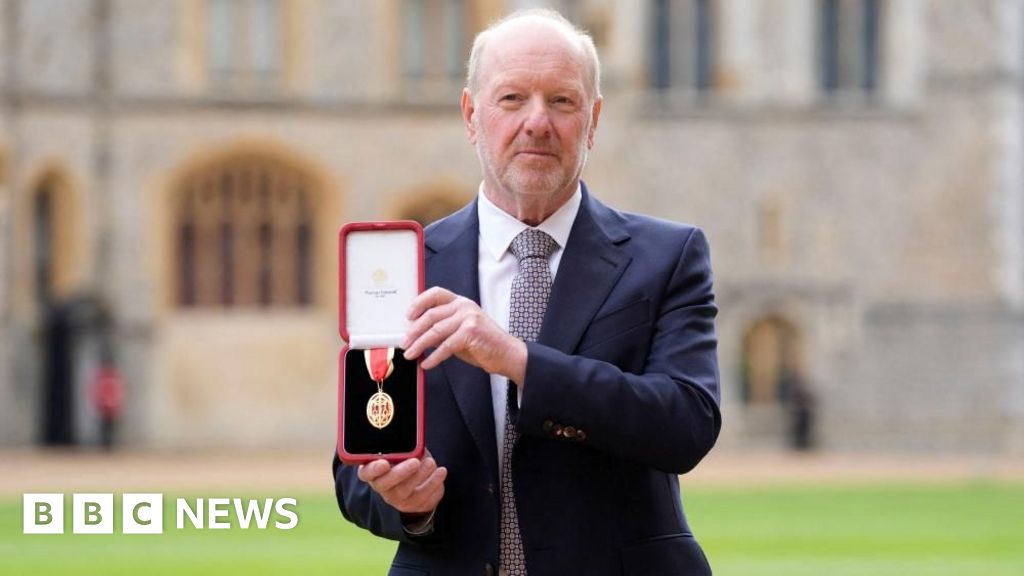ARTICLE AD BOX
By Samira Hussain & Natalie Sherman
BBC News, New York
Ford boss Jim Farley says the launch of the electric version of the classic F-150 pickup is a "big bet by the company"
Ford boss Jim Farley has a lot riding on this moment.
On Tuesday, the Detroit carmaker celebrates the formal start to production of the electric version of the F-150 pickup, the best-selling vehicle in America for decades.
It's a milestone seen as critical for Ford - and for the environment - as the company seeks to convince more Americans to drop their resistance to buying electric vehicles.
"It's a big bet by the company," Mr Farley tells the BBC.
"Certainly for me as the CEO, this is one of the signature moments in my life and in our team's life."
Electric vehicles remain a small fraction of the global car market, accounting for 9% of sales last year.
And in the US - the world's biggest carbon emitter after China, where gas-guzzling sport utility vehicles (SUVs) and trucks dominate the road - it was even smaller, at 4.5%.
Analysts say offering electric versions of popular vehicles will be key to convincing the American public to buy electric.
But whether Ford will be able to convert the large numbers of F-150 loyalists across the country to the "Lightning" remains an open question.
'I don't think I could own one'
Bryan O'Polka is a self-described "truck guy" from a family of Ford owners in Texas, who rely on the firm's pickups to tow jet skis and other loads.
Image source, Bryan O'Polka
Image caption,Bryan O'Polka got his first F-150 as a high school graduation present
The 22-year-old, who hauls cars for a living, received his first F-150 as a high school graduation present. He traded it in for a new one last year and owns a second, bigger Ford pickup as well. His family's fleet includes SUVs and a Ford hybrid, which they used to power their house during a recent outage.
"I like the concept of it," he says of the Lightning. "I'm sure it's going to be great for in-city use."
But while he thinks they're "cool" he says: "I don't think I could own one."
On Facebook, where he is an administrator of one of the many groups for F-150 owners to swap tips, parts and pictures, Mr O'Polka said the launch of the company's Lightning has stirred "a lot of controversy" - with many people especially "older guys" sceptical of its motor, towing power and limited range.
For his part, Mr O'Polka says he wouldn't be able to customise the electric truck to his liking and is turned off by its roughly 300-mile range.
"In my truck right now, I can get 500 to 600 miles out of a tank and I can fill my tank in about five to eight minutes and be back on the road," he says. "An electric truck, you can only get so far and then you'll have to stand and wait [to charge it]."
Different buyer
Mr Farley acknowledges the challenge ahead.
Surveys, both by the company and independent analysts, have found that customers for the F-150 are typically younger, richer, more urban than the truck's traditional mainstream buyer - and in many cases have never owned a truck before.
Image source, Reuters
Image caption,Ford sold more than 700,000 F-150s last year. Electric versions will start to reach customers in North America in the next few weeks
"The communication team would like me to tell you that this was perfectly planned and everyone's a conquest customer," Mr Farley says. "The reality is the people who wound up having orders and reservations for this truck were a little different than we thought. It's different, but that's what makes the business interesting."
In the meantime, the more immediate challenge for Ford may be simply fulfilling its roughly 200,000 pre-orders.
Like the rest of the industry, the company is contending with shortages of key computer processing chips, batteries and other materials that have held back production - and challenged the company's effort to keep the starting price at about $40,000 (£31,500).
"There's definitely headwind coming in our business," Mr Farley says. "It's going to be down to the execution."
Critical moment
Chris Jones, chief analyst at research firm Canalys, says it's "crucial" for Ford that the launch go well.
"Ford has been slow to move to [electric vehicles]... It's really fallen behind," he says. "This is an important category of vehicle and it's a super important category for Ford to succeed in."
Shares in Ford reached their highest levels in years in 2021, as strong sales of the Mach-E version of its popular Mustang SUV built confidence in its strategy.
The company, which is investing $50bn globally through 2026 to electrify its fleet, now says it is on track to deliver more than two million electric vehicles annually by 2026.
While Ford will be one of the first to get its pickups on the road in the US, more than a dozen other carmakers - including Tesla and arch-rival General Motors - are working on their own electric truck offerings.
The Lightning preserves the classic look of the F-150. For now, it's available only in North America
At roughly $40,000, Ford has started selling the F-150 at a price that makes it comparable to traditional pickups, particularly after government incentives for buyers are taken into account.
That makes it one of the few electric vehicles on the market with the potential to conquer the mainstream customer, says Ram Chandrasekaran, Texas-based head of road transport consultancy Wood Mackenzie.
But for most people, he says, a car purchase isn't purely financial - nor is it based on environmental concerns. He said governments will have to push carmakers to invest in performance and marketing to convince buyers to make the switch.
Unless regulations change, his firm expects electric vehicles to account for about 6.5% of US sales this year and 30% by 2030 - roughly where Germany was in the final months of 2021.
"The bottom line is, with what we have, you'd have to get a lot more aggressive [to boost adoption]," he says. "In the current political stalemate that we're seeing I don't think that's likely to happen."
Still there are signs demand is growing, regardless of the rules. Last year, sales of electric cars, including hybrids, in the US nearly doubled to more than 600,000.
US President Joe Biden - who took a spin in the F-150 last year - has also called for significant investment in electric vehicles including for government fleets - a good sign for Ford, says Michelle Krebs, executive analyst at Cox Automotive.
"The potential for higher volume is there," she says. "Who is going to be that audience, how big is that audience, we don't know."

 3 years ago
35
3 years ago
35








 English (US) ·
English (US) ·